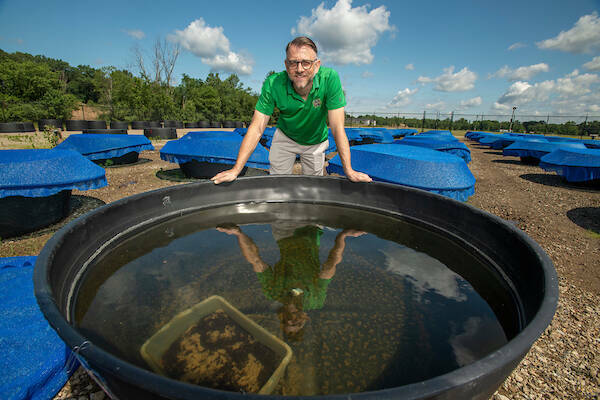
The University of Notre Dame’s Institute for Precision Health (IPH) has awarded funding to researchers spanning multiple departments at the University, as well as to colleagues at partner schools. IPH awarded proposals with two types of funding: seed grants, which provide funding for high-risk, high-reward research ideas, and harvest grants, which help researchers expand on established projects or pursue new projects.
“The IPH is proud to support multidisciplinary research programs that combat disease and its disproportionate burden on vulnerable populations,” said Paul Bohn, Arthur J. Schmitt Professor of Chemical and Biomolecular Engineering, professor of chemistry and biochemistry, and director of the IPH. “This round of funding empowers researchers to branch out from their established programs or chase new areas of interest that could have beneficial, long-lasting impacts.”
 Professor Jason Rohr is a 2021 recipient of the Institute for Precision Health's grant program.
Professor Jason Rohr is a 2021 recipient of the Institute for Precision Health's grant program.The IPH grant awardees are:
Theodore Beauchaine, William K. Warren Foundation Professor of Psychology, Brooke Ammerman, assistant professor of psychology, and Kristin Valentino, William J. Shaw Center for Children and Families Professor of Psychology, for their work, “Leveraging biomarkers and new technologies to reduce self-injury and substance abuse risk among highly vulnerable adolescents.”
Jon Camden, professor of chemistry and biochemistry, Netzahualcoyotl Arroyo-Curras, assistant professor of pharmacology and molecular sciences at Johns Hopkins University, and David Jenkins, associate professor of chemistry at University of Tennessee-Knoxville, for their research called, “A new paradigm for implantable electrochemical sensors: N-heterocyclic carbenes as a robust biofunctional anchor.”
Robert Nerenberg, professor of civil and environmental engineering and earth sciences (CEEES), and Albert Cerrone, Melchor Visiting Assistant Professor of CEEES, for their research titled, “Improved therapies for cystic fibrosis lung infections using the bioacoustic effect.”
Jason Rohr, Galla College Professor of Biological Sciences, Patricia Champion, professor of biological sciences, and Joanna Larson, Moreau Faculty Development Program Fellow in Biological Sciences, for the project, “Identifying the developmental windows when early-life disruption of the microbiome can have lasting effects on immunity and disease risk.”
Jeff Schorey, George B. Craig Professor of Biological Sciences, for the research, “Identify an extracellular vesicle RNA signature specific to active tuberculosis patients.”
Geoffrey Siwo, research assistant professor of biological sciences, and Prakash Nallathamby, research assistant professor of aerospace and mechanical engineering, for the project, “AI-aided rapid design optimization of biomimetic antibacterial phage-mimicking nanoparticles to fight anti-microbial resistance.”
Rebecca Whelan, associate professor of chemistry and biochemistry, and Marya Lieberman, professor of chemistry and biochemistry, for their research titled, “Generation of high-affinity DNA aptamers for drugs of abuse using capillary electrophoresis-based selection.”
Jeremiah Zartman, associate professor of chemical and biomolecular engineering, Donny Hanjaya-Putra, assistant professor aerospace and mechanical engineering, and Hsueh-Chia Chang, Bayer Professor of Chemical and Biomolecular Engineering, for the project titled, “Coupling membrane potential with a hybrid memristor to control endothelial cell proliferation and vascular morphogenesis at the systems level.”
To learn more about the IPH call for proposals and the funding mechanisms of this grant program, please visit precisionhealth.nd.edu/opportunities/call-for-proposals/.
Contact:
Brandi Wampler / Research Communications Specialist
Notre Dame Research / University of Notre Dame
brandiwampler@nd.edu / +1.574.631.8183
research.nd.edu / @UNDResearch
About Notre Dame Research:
The University of Notre Dame is a private research and teaching university inspired by its Catholic mission. Located in South Bend, Indiana, its researchers are advancing human understanding through research, scholarship, education, and creative endeavor in order to be a repository for knowledge and a powerful means for doing good in the world. For more information, please see research.nd.edu or @UNDResearch.
Originally published by at precisionhealth.nd.edu on August 31, 2021.